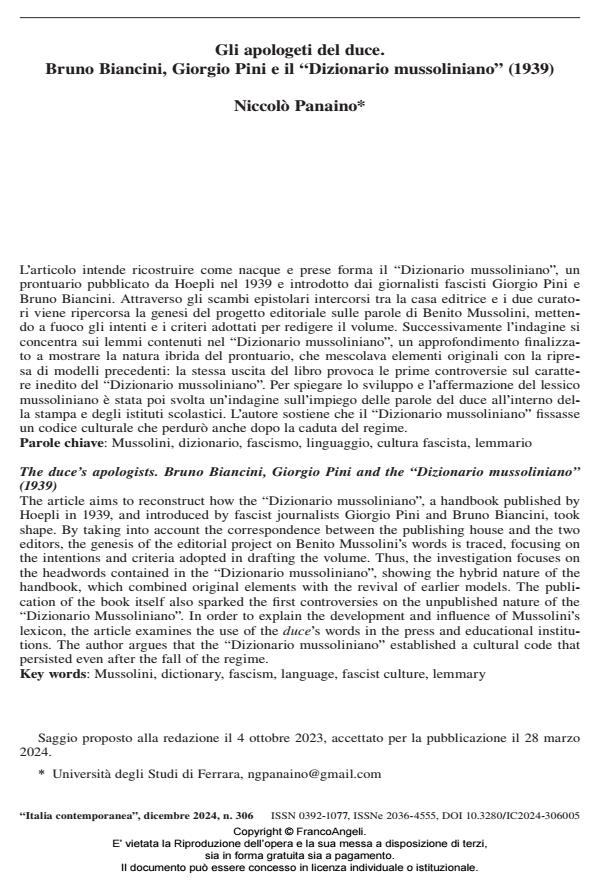The duce’s apologists. Bruno Biancini, Giorgio Pini and the “Dizionario mussoliniano” (1939)
Journal title ITALIA CONTEMPORANEA
Author/s Niccolò Panaino
Publishing Year 2024 Issue 2024/306
Language Italian Pages 25 P. 87-111 File size 346 KB
DOI 10.3280/IC2024-306005
DOI is like a bar code for intellectual property: to have more infomation
click here
Below, you can see the article first page
If you want to buy this article in PDF format, you can do it, following the instructions to buy download credits

FrancoAngeli is member of Publishers International Linking Association, Inc (PILA), a not-for-profit association which run the CrossRef service enabling links to and from online scholarly content.
The article aims to reconstruct how the “Dizionario mussoliniano”, a handbook published by Hoepli in 1939, and introduced by fascist journalists Giorgio Pini and Bruno Biancini, took shape. By taking into account the correspondence between the publishing house and the two editors, the genesis of the editorial project on Benito Mussolini’s words is traced, focusing on the intentions and criteria adopted in drafting the volume. Thus, the investigation focuses on the headwords contained in the “Dizionario mussoliniano”, showing the hybrid nature of the handbook, which combined original elements with the revival of earlier models. The publication of the book itself also sparked the first controversies on the unpublished nature of the “Dizionario Mussoliniano”. In order to explain the development and influence of Mussolini’s lexicon, the article examines the use of the duce’s words in the press and educational institutions. The author argues that the “Dizionario mussoliniano” established a cultural code that persisted even after the fall of the regime.
Keywords: Mussolini, dictionary, fascism, language, fascist culture, lemmary
- La retorica antisemita e l’ἐπανόρϑωσις come suo principio Adele Valeria Messina, in Rhetorik /2025 pp.43
DOI: 10.1515/rhet-2025-0005
Niccolò Panaino, Gli apologeti del duce. Bruno Biancini, Giorgio Pini e il “Dizionario mussoliniano” (1939) in "ITALIA CONTEMPORANEA" 306/2024, pp 87-111, DOI: 10.3280/IC2024-306005